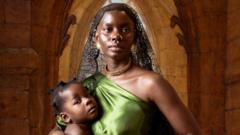Dola Posh embodies various identities: photographer, woman, Nigerian, mother, and Briton. However, after giving birth, she became uncertain of her self-identity. Just six days postpartum, she found herself recuperating in a hospital during the COVID-19 lockdown, grappling with the overwhelming changes in her life and fearing she might never again pursue her passion for photography. Encircled by the caring yet constant calls from relatives, Dola felt immense pressure, exacerbated by being separated from her mother, who lived thousands of miles away in Lagos, Nigeria.
These pressures spiraled Dola into a “dark place" where she struggled with the concept of self, lamenting, “I thought: ‘I’m me; the baby’s out, I’m still me.’ But no, I wasn’t me any more.” Such a loss of identity can often trigger postnatal depression, a condition that disproportionately affects black women. Although Dola initially didn’t recognize her symptoms, she was living in the depths of this struggle.
Post-hospital life presented its own challenges; Dola was met with a torrent of unsolicited parenting advice, leaving her feeling controlled and uncertain in her new role. Despite her efforts to remain composed, she recalls feeling like a “zombie,” a lack of sleep, and the crushing weight of her isolation. At one particularly low moment, a voice inside her urged her to end her life.
Grasping a blanket as her lifebuoy, and with her daughter Monioluwa, meaning "I have God" in Yoruba, by her side, Dola sought solace in her roots, singing songs from Nigeria. When she took the brave step to call her health visitor, she poured out her pain and was encouraged to see a therapist who urged her to channel her emotions into her art.
Rising from her struggles with a new perspective on her photography, Dola began taking self-portraits of herself and Monioluwa using an app to control her camera remotely. These images, reflecting the Madonna and child trope found in Western art, were subconsciously shaped by her upbringing in a religious household, surrounded by depictions of the maternal bond.
Dola's inherent connection to her faith revealed itself as her portraits evolved, merging family essence with her visual storytelling. The act of donning a veil—once a symbol of her faith—transformed her perspective, allowing her to reconnect with her identity and simultaneously contribute to her emotional healing.
By sharing her story of motherhood and postnatal depression, Dola is breaking down the silence and shame that often surround the topic. This year, her impactful journey earned her an award from the camera manufacturer Leica, bolstering her mission to destigmatize postnatal depression among black women. “I want a world where black mothers don’t have to carry so much burden and feel like they have to go through that journey alone,” she articulates passionately.
Dola’s resolve to openly discuss her mental health journey marks a pivotal shift in societal perceptions. “It’s new for a woman to stand there and say: ‘I almost ended my life, I’m not ashamed of it.’ I am still an artist, I am still a woman and I have something to say.” As Dola continues her photographic series, she endeavors to shed light on the darkness of despair and the art of resilience, fostering a newfound sense of understanding and community among mothers like herself.




















